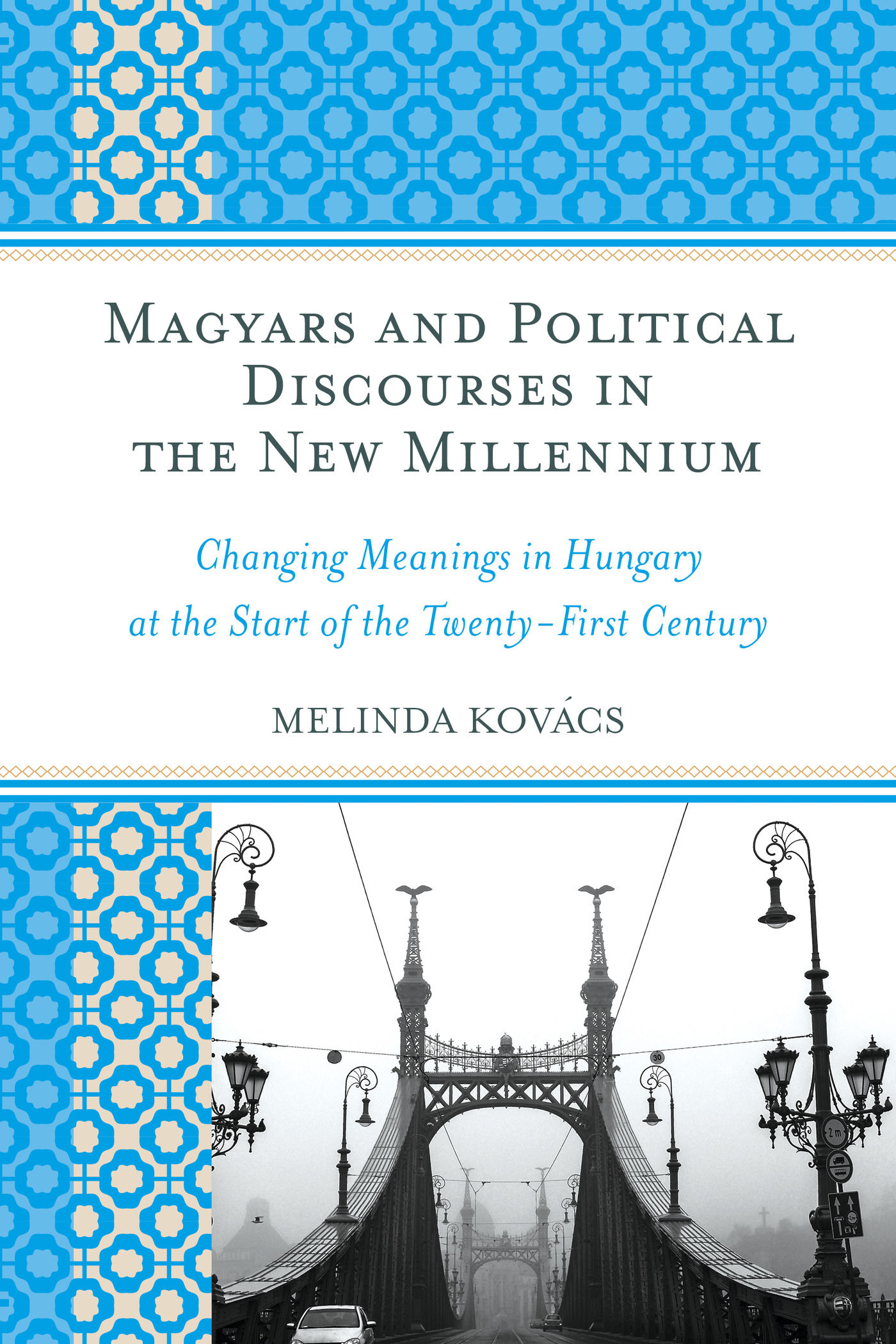Magyars and Political Discourses
in the New Millennium
Magyars and Political Discourses
in the New Millennium
Changing Meanings in Hungary at the Start of the Twenty-First Century
Melinda Kovcs
LEXINGTON BOOKS
Lanham Boulder New York Toronto Plymouth, UK
Published by Lexington Books
An imprint of The Rowman & Littlefield Publishing Group, Inc.
4501 Forbes Boulevard, Suite 200, Lanham, Maryland 20706
www.rowman.com
Unit A, Whitacre Mews, 26-34 Stannary Street, London SE11 4AB
Copyright 2015 by Lexington Books
All rights reserved. No part of this book may be reproduced in any form or by any electronic or mechanical means, including information storage and retrieval systems, without written permission from the publisher, except by a reviewer who may quote passages in a review.
British Library Cataloguing in Publication Information Available
Library of Congress Cataloging-in-Publication Data
Library of Congress Cataloging-in-Publication Data Available
ISBN 978-0-7391-7946-8 (cloth : alk. paper) ISBN 978-0-7391-7947-5 (electronic)
 TM The paper used in this publication meets the minimum requirements of American National Standard for Information Sciences Permanence of Paper for Printed Library Materials, ANSI/NISO Z39.48-1992.
TM The paper used in this publication meets the minimum requirements of American National Standard for Information Sciences Permanence of Paper for Printed Library Materials, ANSI/NISO Z39.48-1992.
Printed in the United States of America
Szleimnek
Acknowledgments
I was always going to write this bookif always is allowed to refer to the (rather long) time that has elapsed since my dissertation was taking shape. The discipline, the language, the methodology, the time frame, and the title all changed multiple times. But I was going to do it. Along the way I accumulated glorious debts of gratitude and now that the book is completed, it is time to face the most impossible of my tasks: thanking those who have helped me along the way.
Those who taught me have been influential beyond anything that fits into a paragraph: Zoltn Kvecses mentored the beginning of my obsession with language and meaning; Andrs Bozki showed me that post-communism is not only something that we live but also something we study; Mikls Sksd gifted me with the interest in media discourses; the late great Carey McWilliams nurtured me into the type of political scientist I am; Linda Zerilli guided me into my first reading of Wittgenstein and made sure I wouldnt get lost; Jan Kubik showed me how to transcend boundaries of methodologies and academic disciplines; and Jzsef Brcz infected and inspired me with his exceptional insight and dedication to unearthing troubling truths while he initiated me to the craft of committed research. My hope is that my work mirrors the outstanding training I received.
During the time leading up to the creation of this book, and sometimes in tandem with some phases of what became the manuscript, I was fortunate to collaborate and co-author pieces with exceptional colleagues and friends. Working with them allowed me to hone my analytical skills, venture into disciplines other than my own, and experience various modes of research. Even though my co-written work is not featured in this book, my ability to complete this project has benefited greatly from the intellect, spirit, and companionship of my co-authors Alexandra Filindra, Olena Leipnik, and Mary Ann Davis. I am grateful for our adventures and inquiries.
During the time of writing, I made my academic home at Sam Houston State University (SHSU) and Missouri Western State University (MWSU). SHSU gave me access to Atlas.ti and a circle of friends who doubled as a department. MWSU provided me with an environment that inspired and motivated me to finish the book. I appreciate both institutions for their role in the completion of this project.
At Lexington Books, Justin Race was the first person to believe in this work and Erin Walpole was the type of editor authors ought to get on prescription. I am thankful for the opportunity to work in a setting where support and professionalism surround creativity.
To those who supported, sustained, carried, uplifted, prayed, charmed, and dragged me through this, my friends and family, with only the most meaningless genetic dividing line between them, I owe the biggest and the most glorious debt of gratitude. gi, Kathy, Julie, Rebecca, Crystal, Dorothy, Trudy, Marjorie, and Sue, I could not have done it with without you.
My family of origin has been the most wonderful launch pad for the type of academic I have aspired to be. They have given me invaluable gifts of love, curiosity, valuing thinking for oneself, discernment about politics, the judicious mixture of exposure and sheltering that allowed me to grow up happy and yet informed during the last chapters of state socialism, and a seemingly infinite willingness to collect newspaper clippings, propaganda mailings, and any bit of political discourse they thought I would find interesting and could pick up on my next visit to Hungary. My sister Ldia introduced me to political science, remained the steadfast voice of reason and humor through all my tailspins, and allowed me the luxurious privilege of always having a supportive presence on the other end of the phone line who gets me and gets the work I am trying to do. My parents deserve the credit for the best of what I have been able to become and are the origin of the good I am capable of. This book is dedicated to them.
In the order of their appearance in my life, I want to thank my angels Chandler, Bailey, Twin, Elsa, and Ruby for all the miraculous contributions they have made to my ability to complete this book precisely because they neither understand nor care about the project.
For his immense ability to understand and care, to stand with me through the good, the bad, and the ugly, and to love me through it all, I want to thank my partner, Julian Brown. Job changes, moves, adoptions, drafts, deadlines, computer glitches, and health crises in my life have done nothing to deter him from being my center, my source, and my blessing. Ksznm Kisszivem!
Introduction
A World of Discourse
In June 2012, I was sitting in my office with a colleague when another colleague ran down the hall to announce that the U.S. Supreme Court had just overturned President Obamas Affordable Care Act. A moment later, the same colleague ran back and said that CNN may have gotten that wrong. The two of us in my office did what most people would have done in that situation: we logged on to our Facebook accounts to see if we could figure out what was really going on. In the following moments, we posted comments about CNN in fact getting it wrong, on those same accounts.
We live in a time in which narratives constrain and liberate us, a time in which discourse holds out opportunities and clips our wings. It is quite likely that our era is no different from all others in this regard, but since we live in an era in which we have unprecedented abilities to perpetrate discourse, it may behoove us more than denizens of other times to examine discourse. Naming, redefining, and questioning are practices whose impact is exponentially greater in an era of social media and blogospheres than in eras lacking those or free from those.
In this book, I examine the perpetration of discourse in Hungary around the beginning of the twenty-first century. This inquiry requires an introduction in each of the areas in which its significance may be questioned and must be affirmed: the stakes of the inquiry, the theory undergirding it, and the method involved in it. This section provides this introduction and then outlines the book.
Next page
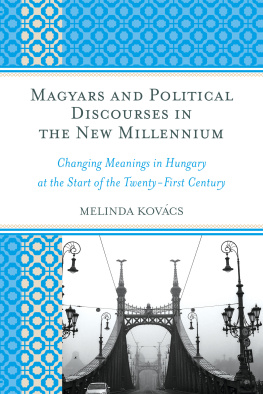

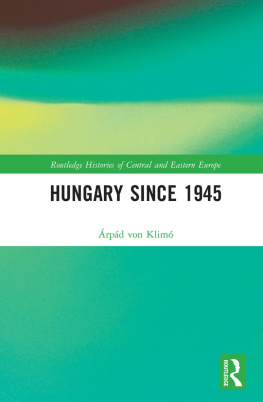
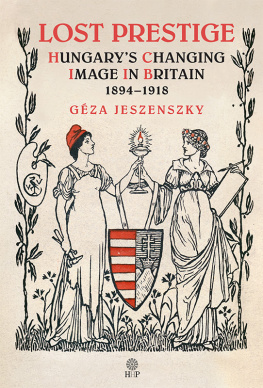
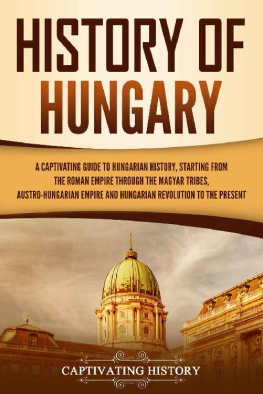


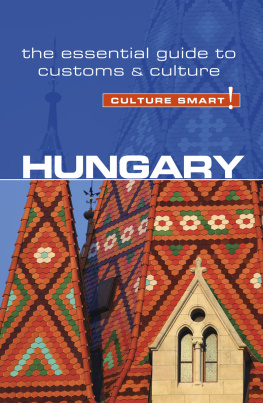
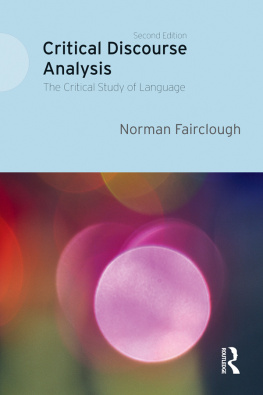
 TM The paper used in this publication meets the minimum requirements of American National Standard for Information Sciences Permanence of Paper for Printed Library Materials, ANSI/NISO Z39.48-1992.
TM The paper used in this publication meets the minimum requirements of American National Standard for Information Sciences Permanence of Paper for Printed Library Materials, ANSI/NISO Z39.48-1992.